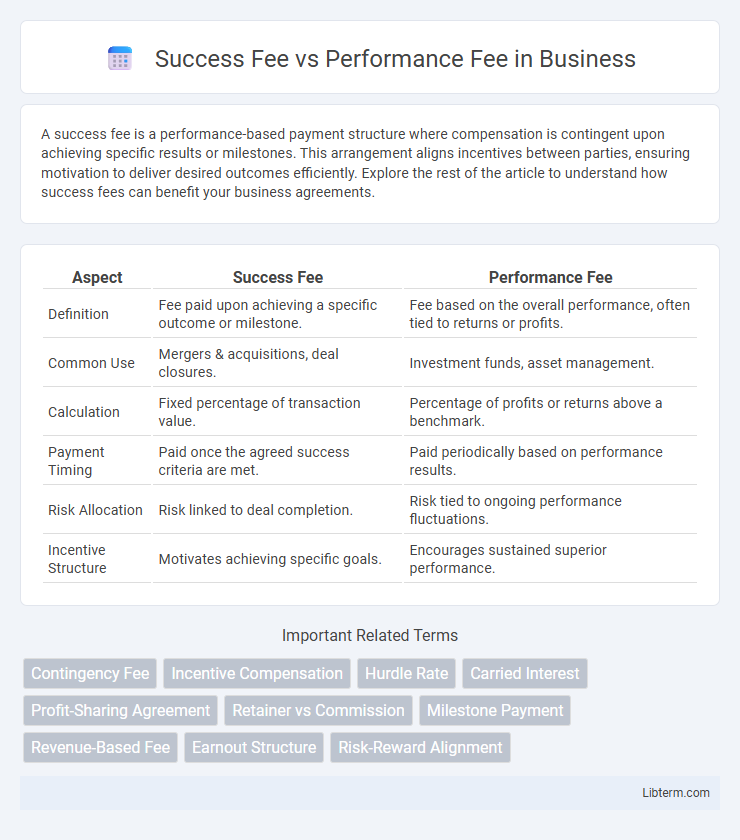A success fee is a performance-based payment structure where compensation is contingent upon achieving specific results or milestones. This arrangement aligns incentives between parties, ensuring motivation to deliver desired outcomes efficiently. Explore the rest of the article to understand how success fees can benefit your business agreements.
Table of Comparison
| Aspect | Success Fee | Performance Fee |
|---|---|---|
| Definition | Fee paid upon achieving a specific outcome or milestone. | Fee based on the overall performance, often tied to returns or profits. |
| Common Use | Mergers & acquisitions, deal closures. | Investment funds, asset management. |
| Calculation | Fixed percentage of transaction value. | Percentage of profits or returns above a benchmark. |
| Payment Timing | Paid once the agreed success criteria are met. | Paid periodically based on performance results. |
| Risk Allocation | Risk linked to deal completion. | Risk tied to ongoing performance fluctuations. |
| Incentive Structure | Motivates achieving specific goals. | Encourages sustained superior performance. |
Understanding Success Fees: A Comprehensive Overview
Success fees are compensation structures where payment is contingent upon achieving specific predetermined outcomes, commonly used in legal, consulting, and investment sectors. These fees align the interests of clients and service providers by ensuring payment only occurs if the agreed-upon goals, such as winning a case or securing a deal, are met. Understanding the terms, conditions, and percentage rates of success fees is essential for evaluating risk and potential return in contractual agreements.
What Are Performance Fees? Key Concepts Explained
Performance fees are compensation structures commonly used in investment management, calculated as a percentage of the profits generated for clients. These fees align the interests of fund managers and investors by rewarding managers only when they deliver positive returns exceeding a specified benchmark or hurdle rate. Understanding the key concepts of performance fees involves recognizing high-water marks, which prevent managers from charging fees on the same gains multiple times, and incentive fees, which motivate enhanced fund performance.
Success Fee vs Performance Fee: Core Differences
Success fee and performance fee differ primarily in their payment triggers and calculation methods. Success fees are typically contingent on achieving a specific outcome or milestone, such as closing a deal or project completion, and are often a fixed percentage of the transaction value. Performance fees, common in investment management, are calculated based on the overall returns relative to a benchmark or hurdle rate, rewarding consistent achievement over time rather than a single event.
Advantages of Success Fees in Business Deals
Success fees align the interests of advisors and clients by linking compensation directly to the completion of a business deal, ensuring motivation for favorable outcomes. They reduce upfront costs for businesses, enabling access to expert services without immediate financial burden. This fee structure fosters trust and long-term partnerships by rewarding tangible results, enhancing the likelihood of successful transactions.
Benefits and Drawbacks of Performance Fees
Performance fees align asset manager incentives with investor returns, promoting proactive portfolio management and potentially higher profits. However, performance fees can encourage excessive risk-taking, as managers may pursue high returns to maximize their compensation, sometimes at the expense of long-term stability. The variability of performance fees also introduces uncertainty in cost structure, making it difficult for investors to predict annual expenses compared to fixed success fees.
When to Choose a Success Fee Structure
A success fee structure is ideal when project outcomes are clearly measurable and directly attributable to the service provider's efforts, ensuring payment only upon achieving specific targets such as closed deals or milestone completions. This fee arrangement aligns client and provider incentives, reducing upfront costs and financial risk for the client, particularly in consulting, legal, or investment advisory services. Success fees work best in scenarios with well-defined goals and a high degree of confidence in outcome realization, providing motivation for providers to exceed performance expectations.
Best Scenarios for Performance Fee Arrangements
Performance fee arrangements are best suited for asset management contexts where investment returns can be directly linked to manager skill, such as hedge funds or private equity funds with clear benchmarks. These fees incentivize managers to exceed predetermined performance targets, aligning their interests with investors who seek above-market returns. Optimal scenarios include volatile markets or strategies with high alpha potential, where variable compensation motivates active management and risk-taking that can enhance portfolio performance.
Legal and Ethical Considerations in Fee Agreements
Success fees and performance fees in legal contracts require clear definitions to prevent conflicts of interest and ensure transparency between parties. Ethical considerations mandate that fee arrangements comply with jurisdictional regulations such as the ABA Model Rules of Professional Conduct, which emphasize fairness, reasonableness, and informed client consent. Proper documentation and disclosure in fee agreements protect against potential disputes and uphold fiduciary duties.
Industry Applications: Success Fees vs Performance Fees
Success fees are commonly applied in legal, consultancy, and real estate industries where payment is contingent on achieving specific client goals or results. Performance fees are prevalent in investment management and hedge funds, aligned with asset growth or returns, incentivizing managers based on fund profitability or benchmark outperformance. Both fee structures optimize stakeholder motivation by directly linking compensation to tangible success metrics in their respective sectors.
Choosing the Right Fee Model for Your Needs
Success fees charge a predetermined percentage only upon achieving specific results, aligning costs directly with successful outcomes, making them ideal for clients seeking risk mitigation. Performance fees typically involve a base fee plus an additional percentage tied to exceeding predefined benchmarks, suitable for investors aiming to reward consistent, above-target returns. Selecting the right fee model depends on your risk tolerance, investment goals, and preference for upfront costs versus outcome-based payments.
Success Fee Infographic

 libterm.com
libterm.com